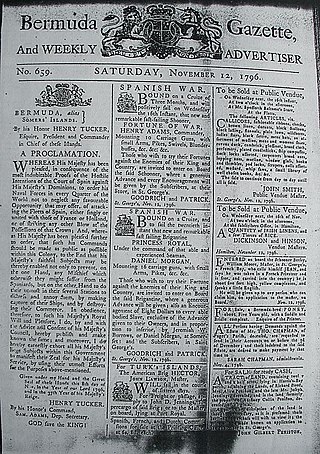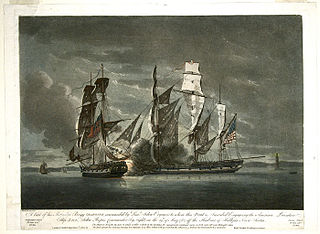Related Research Articles

Bermuda is a British Overseas Territory in the North Atlantic Ocean. The closest land outside the territory is in the American state of North Carolina, about 1,035 km (643 mi) to the west-northwest.

Bermuda was first documented by a European in 1503 by Spanish explorer Juan de Bermúdez. In 1609, the English Virginia Company, which had established Jamestown in Virginia two years earlier, permanently settled Bermuda in the aftermath of a hurricane, when the crew and passengers of Sea Venture steered the ship onto the surrounding reef to prevent it from sinking, then landed ashore. Bermuda's first capital, St. George's, was established in 1612.

A privateer is a private person or vessel which engages in maritime warfare under a commission of war. Since robbery under arms was a common aspect of seaborne trade, until the early 19th century all merchant ships carried arms. A sovereign or delegated authority issued commissions, also referred to as letters of marque, during wartime. The commission empowered the holder to carry on all forms of hostility permissible at sea by the usages of war. This included attacking foreign vessels and taking them as prizes and taking crews prisoner for exchange. Captured ships were subject to condemnation and sale under prize law, with the proceeds divided by percentage between the privateer's sponsors, shipowners, captains and crew. A percentage share usually went to the issuer of the commission.

The British colonization of the Americas is the history of establishment of control, settlement, and colonization of the continents of the Americas by England, Scotland, and, after 1707, Great Britain. Colonization efforts began in the late 16th century with failed attempts by England to establish permanent colonies in the North. The first of the permanent English colonies in the Americas was established in Jamestown, Virginia, in 1607. Colonies were established in North America, Central America, South America, and the Caribbean. Though most British colonies in the Americas eventually gained independence, some colonies have remained under Britain's jurisdiction as British Overseas Territories.

Before European colonization, the Turks and Caicos Islands were inhabited by Taíno and Lucayan peoples. The first recorded European sighting of the islands now known as the Turks and Caicos occurred in 1512. In the subsequent centuries, the islands were claimed by several European powers with the British Empire eventually gaining control. For many years the islands were governed indirectly through Bermuda, the Bahamas, and Jamaica. When the Bahamas gained independence in 1973, the islands received their own governor, and have remained a separate autonomous British Overseas Territory since. In August 2009, the United Kingdom suspended the Turks and Caicos Islands' self-government following allegations of ministerial corruption. Home rule was restored in the islands after the November 2012 elections.

St. George's, located on the island and within the parish of the same names, settled in 1612, is the first permanent English settlement on the islands of Bermuda. It is often described as the third permanent British settlement in the Americas, after Jamestown, Virginia (1607), and Cupids, Newfoundland (1610), and the oldest continuously-inhabited British town in the New World, since the other two settlements were seasonal for a number of years.

Thomas Tudor Tucker was a Bermuda-born American physician and politician representing Charleston, South Carolina. He was elected from South Carolina in both the Continental Congress and the U.S. House. He later was appointed as Treasurer of the United States and served from 1801 to his death in 1828, establishing a record as the longest-serving Treasurer.
South Carolina was outraged over British tax policies in the 1760s that violated what they saw as their constitutional right to "no taxation without representation". Merchants joined the boycott against buying British products. When the London government harshly punished Massachusetts for the Boston Tea Party, South Carolina's leaders joined eleven other colonies in forming the Continental Congress. When the British attacked Lexington and Concord in the spring of 1775 and were beaten back by the Massachusetts Patriots, South Carolina Patriots rallied to support the American Revolution. Loyalists and Patriots of the colony were split by nearly 50/50.
Captain William Sayle was a prominent English landholder who was Governor of Bermuda in 1643 and again in 1658. As an Independent in religion and politics, and an adherent of Oliver Cromwell, he was dissatisfied with life in Bermuda, and so founded the company of the Eleutheran Adventurers who became the first European settlers of the Bahamas between 1646 and 1648. He later became the first governor of colonial South Carolina from 1670 to 1671.

The governor of Bermuda is the representative of the British monarch in the British overseas territory of Bermuda.
The Somers Isles Company was formed in 1615 to operate the English colony of the Somers Isles, also known as Bermuda, as a commercial venture. It held a royal charter for Bermuda until 1684, when it was dissolved, and the Crown assumed responsibility for the administration of Bermuda as a royal colony.

A Virginia State Navy existed twice. During the American Revolutionary War, the provisional government of the Virginia Colony authorized the purchase, outfitting, and manning of armed vessels to protect the colony's waters from threats posed it by the Royal Navy.
Henry Tucker may refer to:
First Sergeant Robert John Simmons was a Bermudian who served in the 54th Massachusetts Volunteer Infantry Regiment during the American Civil War. He died in August 1863, as a result of wounds received in an attack on Fort Wagner, near Charleston, South Carolina.

Lieutenant-Colonel George James Bruere was a British Army officer and colonial administrator who served as governor of Bermuda from 1764 until his death in 1780. Of all Bermuda's governors since 1612, his term of office was the longest. He had a difficult time during the American Revolutionary War and is thought to have died of chronic stress caused by the interplay of Bermudians and American rebels.

Henry Tucker (1742-1800) was a Bermudian politician, and a member of a family that had been prominent in Bermuda since the 1616 appointment of Captain Daniel Tucker as Governor of Bermuda. Henry Tucker was the President of the Governor's Council of the British colony of Bermuda from 1775 to 1807. Prominent men at that time filled a variety of civil and military roles by appointment, and Tucker was also appointed the Colonial Secretary of Bermuda and Provost Marshal General of Bermuda after the resignation of W. O'Brien from those positions in 1785. He was acting Governor of Bermuda in 1796, pending the arrival of new Governor William Campbell. Campbell died almost immediately upon arrival and Tucker resumed the acting Governorship from 1796 to 1798, and again from 1803 to 1805, and in 1806.

Captain Daniel Tucker was an English colonial sea captain, member of the Virginia Company, member of the Somers Isles Company, treasurer of the Jamestown Colony and the notorious second Governor of Bermuda.

The Province of Nova Scotia was heavily involved in the American Revolutionary War (1776–1783). At that time, Nova Scotia also included present-day New Brunswick until that colony was created in 1784. The Revolution had a significant impact on shaping Nova Scotia, "almost the 14th American Colony". At the beginning, there was ambivalence in Nova Scotia over whether the colony should join the Americans in the war against Britain. Largely as a result of American privateer raids on Nova Scotia villages, as the war continued, the population of Nova Scotia solidified their support for the British. Thousands of Loyalist refugees fled to Nova Scotia during the war, and many were resettled in the region after the signing of the 1783 Treaty of Paris as "United Empire Loyalists".
Colonel Robert Tucker was a member of the House of Burgesses who represented Norfolk County, Virginia, a mariner, and a slave owner. His father, mother and uncle, from the Caribbean, had an extensive mercantile trade and a number of ships that sailed throughout Chesapeake Bay and the Caribbean. In 1737, Robert Tucker inherited the mercantile empire and slaves that were crew members on ships. He was active in politics from the time that Norfolk, Virginia was established as a town. He became the first alderman and was a mayor three times. His role as alderman, a lifetime role, gave him a lot of power to determine how business would be conducted. Tucker also ran a mill and bakehouse.
References
- ↑ Jarvis, Michael (2010). In the Eye of All Trade. Chapel Hill: University of North Carolina. p. 375-448.
- ↑ Wilson, John Paden (2023). Counterrevolutionary Bermuda: Privateering and Loyalism in the Revolutionary British Atlantic (PDF) (MA thesis). University of Charleston, South Carolina.
- ↑ Greenwood, Isaac (1896). Bermuda During the American Revolution. Boston: David Clapp and Son. p. 6.